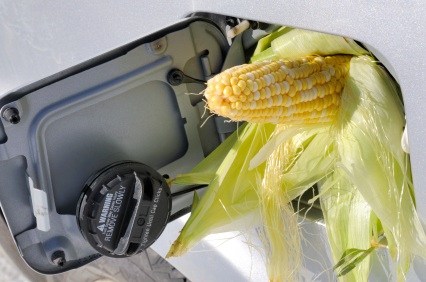 Burning industrial corn in your gas tank: just as dumb as it looks in this silly picture.It’s no mystery where Grist comes down on the food vs. fuel debate, aka the Great Ethanol Boondoggle. But it’s nice to see the science continuing to support our side of the argument (via Science Daily):
Burning industrial corn in your gas tank: just as dumb as it looks in this silly picture.It’s no mystery where Grist comes down on the food vs. fuel debate, aka the Great Ethanol Boondoggle. But it’s nice to see the science continuing to support our side of the argument (via Science Daily):
Using productive farmland to grow crops for food instead of fuel is more energy efficient, Michigan State University scientists concluded, after analyzing 17 years’ worth of data to help settle the food versus fuel debate.
“It’s 36 percent more efficient to grow grain for food than for fuel,” said Ilya Gelfand, an MSU postdoctoral researcher and lead author of the study. “The ideal is to grow corn for food, then leave half the leftover stalks and leaves on the field for soil conservation and produce cellulosic ethanol with the other half.”
Other studies have looked at energy efficiencies for crops over shorter time periods, but this MSU study is the first to consider energy balances of an entire cropping system over many years. The results are published in the April 19 online issue of the journal Environmental Science & Technology.
“It comes down to what’s the most efficient use of the land,” said Phil Robertson, University Distinguished Professor of crop and soil sciences and one of the paper’s authors.
The researchers go on to observe that using some of the crop waste from, say, corn fields to make fuel (while reserving the rest to plow back into the soil) increases the efficiency of the process. But they also point out that that technique won’t provide nearly enough fuel for our gas tanks.
They also hold out hope, as do many in the biofuel industry, for cellulosic biofuels that can be grown on marginal land. But the fact is that a cash crop on marginal land is worth even more on prime farmland — once we go that route it will be very hard to keep biofuel crops from displacing food crops, especially in the developing world.
The conclusion I draw from this study is that it’s a terrible idea to put fuel in competition wtih food for productive farmland. The system is designed to favor fuel production at this point and now we know that’s actually a waste of energy, rather than a source. With any luck, this new data will be included in the EPA’s controversial review of its indirect land-use calculations for the climate impact of biofuels.
Ultimately, I do think biofuels have a role in our economy, but it will be through farmer cooperatives that grow and process biofuel for their own tractors and not for suburban warriors and their SUVs.



